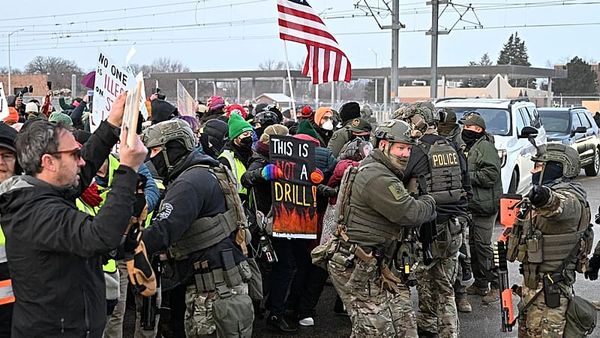
I reckon I was about 11 or 12 when it dawned on me there were some definite holes in Pentecostal Christian theology – the idea that bad things are the work of Satan, good things the result of hands-on intervention from God himself. It was, I thought, letting us humans (whether we act well or badly) off the hook for the consequences. I didn’t realise it at the time but that was probably the beginning of the end for me and the Christianity I was raised in.
In the last few years the average evangelical Christian has seen once-adored leaders like the Hillsong pastors Brian Houston and Carl Lentz fall from grace. They have contributed their money to the church, only to read explosive reports of it sometimes being spent on excessive gifts and expensive flights for pastors. Devastating allegations of serious sexual and financial misconduct have emerged throughout the Pentecostal world.
I was born into the Australian Pentecostal world. Growing up, my family attended numerous small churches, many of them located in suburban Returned Services League function rooms (the Jesus who drove out the money traders from the temple would have definitely gotten a kick from a church amid the poker machines). We belted out Christian pop songs with lyrics projected on overhead projectors in various school halls, each with different levels of air conditioning. But our evangelical journey began with the “one”. Back then, it wasn’t called Hillsong but the less melodic Christian Life Centre, led by Frank Houston (later revealed to be a confessed paedophile).
Throughout the 90s we often had small Bible study or prayer groups in our home. I recall sitting in my bedroom, listening to adults engaging in spiritual warfare outside, the hypnotic booming rhythm of adults speaking in tongues. Looking back, I was probably the only kid at school who regularly witnessed demons being cast out in his living room. To me, all of this seemed normal.
As a teenager, I even chose my own church separate from my parents, and drove other kids to and from youth groups on Fridays. While my parents’ marriage was slowly falling apart, I spent my last years of high school finding excuses to stay with other church families. I’m not entirely sure if these wonderful people knew the refuge they provided or if they were simply following what they felt Christ would do. Nonetheless, they exemplified the best of what Christianity can be.
And yet deep down, I knew something didn’t quite add up. The speck of scepticism I had as a preteen gradually developed into a swarm of urgent questions: From the classics: Why does God allow bad things to happen? I graduated to Can we interpret the “made the universe in seven days” literally or as an allegory? Is there any room for flexibility in the “no sex before marriage” (asking for a friend)? Also, can I get direct confirmation that this zealous televangelist, who spews hellish rhetoric about queer people, is in fact a direct mouthpiece from God?
These questions accumulated but the answers did not. The most pivotal question for me was this: God, why can’t I feel you?

Pentecostalism has always been a faith built on feeling. The lights, music and even the acquired wealth all aim to guide congregants toward experiencing the warm, fuzzy and exhilarating embrace of the “Lord’s spirit”.
No matter how hard I tried, I never felt it. I faked it. A lot. But one day, while others bowed their heads, raised their hands and shed tears, I couldn’t continue the charade any longer. I simply had to get out.
Now, 17 years later, as a non-believer, I find myself in the unusual position of witnessing many Pentecostal Christians making their own exodus from Hillsong. According to the megachurch’s own reporting, online and in-person attendance and “giving” has dropped. The question that arises is: what comes next?
Several evangelical churches across Australia, some of which have long lived in Hillsong’s shadow, appear to be positioning themselves to inherit the flock. There has been a surge in evangelical expansions and church plantings in Hillsong’s vicinity. Privately, they acknowledge that they are receiving hurt former Hillsong members.
Hillsong ranks as one of Australia’s most successful global exports. Right under iron ore and Hemsworth brothers. Aside from the multiple campuses dotting the globe, millions of people around the world sing their Grammy award-winning music each week.
But while there has been considerable media attention given to the rise and fall of celebrity pastors, these reports often feel distant from the experiences of everyday Christians, making it surprisingly easy to brush them off as attacks by “the enemy” – or worse – the “mainstream media”.
Journalists don’t help, by the way. Every time there’s the obligatory reference to Justin Bieber joining Hillsong or the oft-repeated falsehood that the former prime minister Scott Morrison was part of Hillsong (he went to its conference, as almost every Pentecostal does at some point, he was actually a member of Sydney’s Horizon church), Pentecostal Christians’ eyes roll so far back into their heads it’s a heavenly miracle they haven’t done permanent ocular damage. And in a sense, this trend has hurt because these stories often mask deeper issues that directly affect congregants’ lives.
There is a long list of people who feel manipulated into giving their money and volunteers who find themselves crossing healthy boundaries, even taking care of pastors’ children or doing lawn maintenance for church leadership. While it is often said that a “healthy church is a growing church”, it is often the foot soldiers who make that growth happen.
The new generation of Australian megachurches is acutely aware of this pressure point. For example, Western Australia’s booming church Kingdomcity now has 30 global locations, from Bristol to Mozambique. When we visited its Perth campus for our new SBS documentary The Kingdom, we were warmly welcomed, but the PR guru (the big churches all have one) was adamant we had to turn off the cameras when church leaders “asked for the offering” (the money bit of the service). They are wary of how it will be seen.
There’s nothing said in this film that I didn’t hear over and over again in hushed tones growing up in evangelical churches. But a toxic positivity often hinders the proper addressing of burnout, exploitation and financial manipulation. These are real-life issues affecting everyday Christians.
I got a distinct sense that most Pentecostal churches hate being tarred with the Hillsong brush. If this is true they should seize this moment. Congregants asking tough questions of their leaders is not ungodly; it is not an attack. It presents a chance to move closer to the best that faith can offer, the faith that provided me refuge as a teenager.
The Kingdom is available to stream on SBS On Demand and premieres at 7.30pm on Sunday 11 June on SBS







